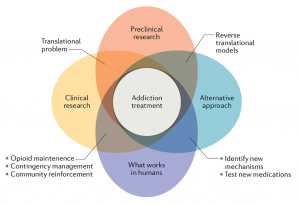 Reviews To Read – October 2020.
Reviews To Read – October 2020.
Recent advances in animal addiction models have emphasized translational challenges. In this Review, Venniro and colleagues introduce a reverse translational approach that may provide an ecologically relevant platform from which to discover new circuits, test new medications and improve translation.
Venniro, Marco; Banks, Matthew L; Heilig, Markus; Epstein, David H; Shaham, Yavin
Improving translation of animal models of addiction and relapse by reverse translation Journal Article
In: Nature Reviews Neuroscience, 2020, ISBN: 1471-0048.
@article{Venniro:2020aa,
title = {Improving translation of animal models of addiction and relapse by reverse translation},
author = {Marco Venniro and Matthew L Banks and Markus Heilig and David H Epstein and Yavin Shaham},
url = {https://pubmed.ncbi.nlm.nih.gov/33024318/},
doi = {10.1038/s41583-020-0378-z},
isbn = {1471-0048},
year = {2020},
date = {2020-01-01},
urldate = {2020-01-01},
journal = {Nature Reviews Neuroscience},
abstract = {Critical features of human addiction are increasingly being incorporated into complementary animal models, including escalation of drug intake, punished drug seeking and taking, intermittent drug access, choice between drug and non-drug rewards, and assessment of individual differences based on criteria in the fourth edition of the Diagnostic and Statistical Manual of Mental Disorders (DSM-IV). Combined with new technologies, these models advanced our understanding of brain mechanisms of drug self-administration and relapse, but these mechanistic gains have not led to improvements in addiction treatment. This problem is not unique to addiction neuroscience, but it is an increasing source of disappointment and calls to regroup. Here we first summarize behavioural and neurobiological results from the animal models mentioned above. We then propose a reverse translational approach, whose goal is to develop models that mimic successful treatments: opioid agonist maintenance, contingency management and the community-reinforcement approach. These reverse-translated `treatments'may provide an ecologically relevant platform from which to discover new circuits, test new medications and improve translation.},
keywords = {},
pubstate = {published},
tppubtype = {article}
}
Critical features of human addiction are increasingly being incorporated into complementary animal models, including escalation of drug intake, punished drug seeking and taking, intermittent drug access, choice between drug and non-drug rewards, and assessment of individual differences based on criteria in the fourth edition of the Diagnostic and Statistical Manual of Mental Disorders (DSM-IV). Combined with new technologies, these models advanced our understanding of brain mechanisms of drug self-administration and relapse, but these mechanistic gains have not led to improvements in addiction treatment. This problem is not unique to addiction neuroscience, but it is an increasing source of disappointment and calls to regroup. Here we first summarize behavioural and neurobiological results from the animal models mentioned above. We then propose a reverse translational approach, whose goal is to develop models that mimic successful treatments: opioid agonist maintenance, contingency management and the community-reinforcement approach. These reverse-translated `treatments'may provide an ecologically relevant platform from which to discover new circuits, test new medications and improve translation.
